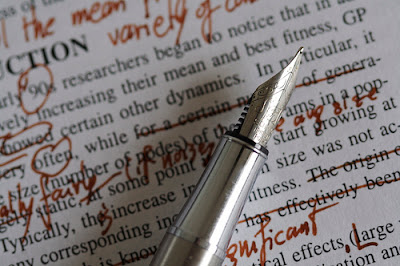Run a Consistency Check
I am probably the last person you want to take editing
advice from. Only now, ten years after self-publishing a flurry of novels, am I
giving them the edits they deserve. I also can’t teach you how to write. Most
people can’t write. Some write badly. Many who have more or less mastered the
mechanics still write bland, boring books.
Nevertheless, your novel can always be improved. Ideally,
long before publication. While going over one of mine about eight times now, I’ve
made a few observations that can shore up any story. Even if your book is bad,
the writing should be consistent. That will make it significantly…less bad.
Doing a global search for these pitfalls can reveal numerous issues. But don’t use a global replace, or you’re likely to make changes you didn’t intend.
Okay/Ok
Pick one usage and stick with it. Personally, I feel ‘okay’
is the way to go, here. But, whatever. Don’t include a mix of usages. Ok?
Contractions
Traditionally, we were taught not to use contractions in our
narrative. I find that not using them in that case feels stilted, and seriously
affects your tone. You don’t want your contemporary novel to sound like it was
written in the 1800s, do you? Again, it’s a choice of styles, but whatever you
choose, make sure you follow that pattern throughout the entire book. This
doesn’t apply to dialogue, of course.
Foreign words/accents
If you’re including a second language, no matter what
amount, don’t make assumptions about spelling and phrasing. Take the time to do
your research here, and make sure you get it right. If a word gets accented in
its native form, then accent your usage as well.
Open and closed quotes
I’ve noticed that Microsoft Word’s “Smart Quotes” could be
smarter. Sometimes after a spate of typing or editing, it will enclose a
quotation with two closed or open quotes, instead of a matched pair. It can be
easy to overlook.
Brand names
Visquine, right? No, it’s actually Visqueen. Weird.
Plexiglass is generic, Plexiglas is a particular brand. It only takes a few
seconds to check, but it’s an important detail that's easy to get wrong.
Ellipses
One could write an entire column on these three little dots,
and many have. Aside from taking a look at how often you use this device, make
sure the application is consistent. There are multiple ways to go, all are
correct in one school of thought or another. Just make sure you don’t mix and
match them.
Names vs. Pronouns
This is a big one. I write longhand, and used to turn my
stuff over to my typist. I have no idea how she was able to decipher my
handwriting. But when you’re banging out pages this way, you tend to use your
character’s names more often than you should. At least that’s the case for me. Wherever
possible, use a pronoun if the subject is made clear by context. That’s not to
say obliterate every reference to a character’s name, but it generally doesn’t
need to be used more than once a paragraph. Each occurrence should also be viewed
against the previous and following paragraphs. Find a balance between clarity
and style, and err on the side of pronouns.
Word choice/proximity
I hate when I use the same word near itself. Consequently, I
am able to avoid it most of the time. Even so, I slip up, and kick myself
later. Especially when the text goes to audiobook format, which is a lot harder
to get changed. As you edit, pay attention to this aspect. That’s not to say
you should go crazy with synonyms if a scene necessitates using the same word
several times, but in briefer instances, that’s a good solution. Barring that,
you might consider rewriting the passage to minimize repetition.
Do you really need that semi-colon?
Probably not. I just don’t like them. They should be used
sparingly, if at all. I’ve found that most sentences that use semicolons work
just as well or better when split into two sentences. If you’re using them, make
sure they’re justified.
So, But, and And
It is incredibly easy to overuse these words at the
beginning of a sentence. In most cases, it works just as well without them. They’re
better suited for dialogue. That’s not to say you should never begin a sentence
in the narrative this way, but be aware that you’re doing it, and how often.
Overusing words in general
Once you get past words that absolutely will be repeated
endlessly, we all have some that we favor without knowing it. If one keeps
popping up in your edit, do a search to get a count of how many times this is
happening. It sounds a bit dispassionate, but statistical analysis can improve
your text.
Adverbs
Search for words ending in -ly. Eliminate three quarters of
them. It sounds harsh, but it will improve the quality of your work
tremendously. Oops.
Approaching these problems in a global fashion will
speed up your editing process in the long run, and make for a much more consistent
book. It’s not a substitute for poring over each sentence word by word, but
running a consistency check before you dive into deep editing will eliminate
the possibility of accumulating many small stylistic errors that can add up in
a longer piece. Once you become aware of these problems in your text, I daresay
your next effort will be much improved from the start.
Don't read my books. Seriously. I'm relaunching them slowly, one at a time. On the other hand, my audiobooks are worth listening to...
https://www.audible.com/search?searchAuthor=Jason+Z.+Christie










Comments
Post a Comment